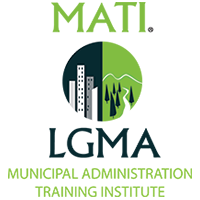Capilano University, in partnership with the Local Government Management Association (LGMA) of BC, offers MATI® (Municipal Administration Training Institute) courses.
Capilano University in partnership with the Local Government Management Association of BC offers the following MATI® (Municipal Administration Training Institute) courses:
- PADM 204 MATI® Leadership in Local Government Organizations
- PADM 205 MATI® Advanced Communication Skills in Local Government Organizations
- PADM 207 MATI® Managing People in Local Government Organizations
- PADM 208 MATI® Community Planning in Local Government Organizations
- PADM 308 MATI® The Successful CAO – Local Government Advanced Management
If you are interested in attending a 2022 course, please email localgovernment@capilanou.ca.
 These programs have been developed in partnership with the Local Government Management Association of BC working with senior practitioners in the field of local government, and educators familiar with current and on-going issues facing local government.
These programs have been developed in partnership with the Local Government Management Association of BC working with senior practitioners in the field of local government, and educators familiar with current and on-going issues facing local government.
Each course offers participants extensive opportunities for skill building, discussion and interaction with a widely diverse group of leading academic and local government figures. The MATI® courses do not need to be completed in order.
Also, see the LGMA website for further information about MATI® programs.
Which MATI® courses are offered by CapU?
For over two decades, MATI® Leadership, “PADM 204: The Leadership Experience,” has been the essential course for people working in local government leadership roles in British Columbia. Join us and find out why!
Developed by senior practitioners from the Local Government Management Association of BC and Capilano University, MATI® Leadership blends theory with practice in an engaging and highly interactive program.
Participants will:
- Gain a deeper understanding of their personal leadership strengths.
- Discover the skills and qualities that make local government leaders effective.
- Meet and learn from our diverse and highly experienced guest faculty.
- Learn techniques to meet the increasingly complex challenges facing local governments.
- Work individually with experienced faculty and mentors to hone their leadership skills.
Sessions include:
- Assessing your personal leadership values and skills.
- Leading effective and successful teams.
- Leading under pressure and managing stress.
- Leading a strategic planning process.
- Leadership during emergency situations.
- Change management and leading in uncertain times.
- Complex problem-solving through scenario-based case studies.
- An evening of open conversations with highly experienced CAOs and other notable local government leaders.
- An interactive simulation: “A Day in the Life of a Local Government Leader.”
- Developing a personal leadership action plan.
This course is designed to provide local government professionals with an opportunity to participate in communication skill-based training to strengthen their individual and team performance.
Managing change, collaborating, and navigating difficult conversations are essential communications competencies, which local government professionals must demonstrate daily. This course will assist participants to become more effective in these areas.
Participants will:
- Learn to be a more effective communicator.
- Enhance their communication knowledge and skills.
- Learn from the Best of Them (One-on-One access to Local Government leaders).
- Receive professional feedback from a registered psychologist who works closely with Local Government Professionals.
Sessions include:
- Communication essentials.
- Resolving conflict skills/Coaching skills.
- Resolving conflict skills – application/Effective council-staff relations.
- Negotiating skills/Communicating with diverse populations/Leaders roundtable.
- Communicating effectively with and through the media/Public consultation skills.
Local government organizations today have to be increasingly agile – thinking, performing, and changing continuously to meet both the ever-changing needs of the external community and the internal community of its diverse workforce.
Management and supervisory excellence in local government demands more than a thorough knowledge of a specialist field. It also requires leadership competencies such as the ability to inspire, coach, foster cooperation, and manage conflict.
Equally vital is the need to successfully navigate human resource skills – from attracting, acquiring, and retaining talent, performance leadership planning that drives high performance, coaching, and effectively managing and addressing performance challenges while ensuring staff are engaged, feel valued, and have a sense of belonging.
In this course, participants will:
- Improve skills with hands-on practice and interactive discussions.
- Benefit from working side-by-side in small groups with human resources professionals.
- Receive advice from expert practitioners on your workplace challenges and issues.
- Develop a network of local government colleagues.
- Have one-to-one access to B.C. local government leaders.
- Have fun while you are learning!
Sessions include:
- Use self-awareness tools to develop an understanding of your personal style, strengths, and weaknesses.
- Use conflict-reducing language and identify bigger picture issues, so you can coach for superior employee performance and help staff succeed.
- Learn about current policy and practices to build a respectful workplace.
- Focus on recruitment, selection, talent management, and effective succession planning.
- Examine the relationships between management, union, and employees. Workshop real employment situations that you bring to the class for discussion.
- Engage with experienced local government professionals in an "Ask Me Anything" session about the challenges of managing people.
- Learn innovative strategies for motivating staff and building powerful teams.
- Learn to manage stress and change constructively to achieve a better work-life balance.
This program is designed by a team of B.C. local government planners and educators for participants seeking to learn how the planning system really works in B.C.
Whether you have no formal planning education or little planning experience, this course will equip you with practical knowledge, tools, and techniques that you will be able to use immediately when you go back to work.
Specific course topics include planning law, the planners’ toolkit including OCPs and zoning, Approving Officer’s role, sustainable and complete communities, community engagement on planning issues and what you need to know about hiring planning consultants.
At the course you will work on a planning challenge from your community and leave with solutions you can implement.
Participants will:
- Work with some of the most highly regarded planners in B.C. and build a network of local government and planning colleagues.
- Learn to work more effectively with Council/Board and community members on planning and development issues.
- Develop a critical understanding of various planning approaches.
- Learn to administer various land-use permits, regulations, bylaws, and subdivision processes.
- Learn to apply the principal approving officer tools.
- Learn to effectively oversee land-use planning consultants.
- Bring a challenging planning issue to discuss with planning experts and colleagues.
Sessions include:
- Learn about the history of community planning and get familiar with planning concepts and jargon.
- Explore why planning is important to manage change in communities and examine planning movements and trends.
- Discuss key legislation relevant to planning in B.C. and learn how it applies to specific local issues.
- Describe a major planning challenge (of your choice) from your community that you would like to work on during the course.
- Learn about common planning tools (Official Community Plans, zoning bylaws, development permits, temporary use permits, variances, amenity zoning and more!) and how to apply them in your community.
- Learn the basics of the subdivision process and what an approving officer does.
- Develop an effective public engagement plan with techniques and strategies that work.
- Discuss emerging issues in community planning, including sustainability, affordable housing, climate change, reconciliation, and diversity.
- Learn how to find, manage, and evaluate planning consultants who are a good fit for your community.
This exciting MATI® course provides current and aspiring Chief Administrative Officers (CAOs) with strategies for long-term success in this senior executive position.
Designed by educators and experienced CAOs, the focus is on management knowledge and skills unique to this role in B.C. municipalities, regional districts, and First Nations governments.
This course explores the many facets of the CAO role, equipping you with practical knowledge, tools, and techniques that will allow you to prepare for success and effectively manage the opportunities and challenges you face.
Who is this course for?
This course is designed for new CAOs and aspiring CAOs (e.g. from senior management in local government) who seek to advance their knowledge and skills and build a supportive network of colleagues. It will also interest more experienced CAOs who are taking on a new position or seeking targeted training specific to the CAO role.
Pre-requisites:
Participants must have taken at least one of the following courses: MATI® Advanced Communications, MATI® Managing People, MATI® Leadership, or PADM 307 Ethics in Local Government.
If you are a current CAO (including an Acting or Deputy CAO) but do not meet the pre-requisites, please contact Linda Adams at lindaadams@capilanou.ca.
In this course, participants will:
- Analyze and recommend solutions to real-world scenarios faced by CAOs.
- Develop effective strategies and a personal action plan for long-term success.
- Learn and be mentored by experienced CAOs.
- Build your best practices toolkit for supporting council and board effectiveness.
- Apply public interest and ethical decision-making frameworks to key issues.
- Learn effective approaches to managing relationships, “up, down, and out.”
Sessions include:
- Create an action plan that includes strategies for success that address your specific local government situation.
- Describe success in the CAO role and assess your strengths, weaknesses, and capacity in relation to it.
- Define the critical roles and responsibilities of the CAO.
- Improve your understanding of the nature and strategic importance of CAO relationships with other key actors.
- Analyze ethical and emerging issues and recommend strategies to address them.
- Evaluate challenging local government scenarios and recommend solutions.
- Identify strategies for supporting Council and Board effectiveness.
- Assess strategies for supporting effective teams, a positive organizational culture, and describe successful approaches to organization oversight and management.
- Apply management models to analyze your current local government situation.
- Leave with a plan to continue to develop your CAO knowledge and skills for long-term success.
What will I learn in MATI® courses?
Each course offers participants extensive skill-building opportunities, discussion and interaction with a widely diverse group of leading academic and local government figures. The MATI® courses do not need to be completed in order.
What are the next steps?
If you are interested in attending a MATI® course, email localgovernment@capilanou.ca or visit the LGMA website for further information.
